DOWNLOAD
ROUNDUP: NOVEMBER 2011/2
Brian
Wilson
The previous roundup is here
and earlier editions are indexed here.
I had expected to be able to write that classicsonline.com had
finally sorted out their pricing policy for EMI and Virgin Classics
downloads, now that their 2-CD budget sets have settled at £6.99
or, occasionally, £7.99, but new anomalies now seem to
have sprung up, with the budget-price Encore label, formerly
at £3.99, having been re-priced at £8.99, which
is more than the £7.99 which they charge for full-price
albums. The recommendable Christian Zacharias set of the Beethoven
Piano Concertos is a case in point: the 3-CD pack of the whole
set plus the Triple Concerto is offered for a very tempting
£6.99, but you’ll pay £8.99 for the single Encore
CD of Nos. 4 and 5.
Recording
of the Month
Ludwig van BEETHOVEN (1770-1827)
Overture Coriolan [7:00]
Symphony No.5 in c minor, Op.67 [30:04]
Symphony No.6 in F (Pastoral), Op.68 [38:27]
Leipzig Gewandhaus Orchestra/Riccardo Chailly - rec. 2007-9.
DDD
From DECCA 478 2721 [75:32] - from
amazon.co.uk (mp3)
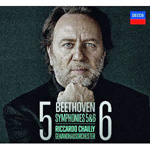 If
you are eager to see what all the hype was about, but unwilling
to go for yet another complete set of the Beethoven symphonies,
you will have to wait until February 2012 to obtain the separate
CDs from the set, but they are available to download now at
£7.49; that’s not expensive, but you miss the price advantage
of buying the whole set.
If
you are eager to see what all the hype was about, but unwilling
to go for yet another complete set of the Beethoven symphonies,
you will have to wait until February 2012 to obtain the separate
CDs from the set, but they are available to download now at
£7.49; that’s not expensive, but you miss the price advantage
of buying the whole set.
You may have noted with surprise the fact that the Fifth and
Sixth symphonies have been squeezed onto one CD, let alone the
bonus. Chailly’s tempi provide the answer: right from the
start of the Coriolan Overture you know that this is
going to be no-nonsense Beethoven. The grand style is never
overdone, however; the opening of the Fifth is comparatively
matter-of-fact and all the more effective for it. The whole
symphony is taken at quite a pace - reminiscent of Klemperer’s
mono EMI recording which fitted on a 10" LP. The first
movement, indeed, at 6:38, is actually a minute and a half faster
than Klemperer’s earlier Vox recording (CDX2-5527 - download
from classicsonline.com).
To compare just a few other recordings which I’ve recommended,
Sir Charles Mackerras (Hyperion CDS44301/2
- see March 2010 Roundup)
and Carlos Kleiber (DG - March 2010 Roundup)
come close at 7:04 and 7:22 respectively, while the stereo Klemperer
(8:05), Michael Tilson Thomas (SFS Media - July 2011/1 Roundup)
at 8:11 and Cluytens (Beulah Extra - January 2011 Roundup)
at 8:27 sound just a little too slow.
The slow movement is taken at quite a pace, too - again slightly
faster than Mackerras and much faster than Tilson Thomas, Cluytens
and Kleiber. If you want grandiose super-inflated Beethoven
- not that I’d describe the Tilson Thomas in quite those terms
- steer clear of Chailly and Mackerras. I don’t think I’ve ever
heard the third movement, again taken at a fast pace, offer
quite such contrast between the lilting, dancing theme and the
ominously rumbling background. Nor is there any over-emphasis
in the finale. I frequently come away from the over-performed
Fifth aurally fatigued, battered even, but not so when I hear
this Chailly performance - or Mackerras’s.
There’s no hanging about in the Pastoral either. If you’re
looking for something dreamy and decorative in the eighteenth-century
sense of the word ‘pastoral’, you won’t find it here. You will,
I think, experience the storm of emotions that Beethoven had
undergone in the course of writing this symphony. It’s easy
to listen to the Pastoral with half an ear - it’s even
more over-exposed on BBC Radio 3 than the Fifth - but Chailly
will make you take notice. Are the peasants dancing a little
too leaden, perhaps, or does this version make you think, quite
appropriately, of Brueghel? That’s just about my only slight
reservation.
So far I’ve left out of consideration the recent period-instrument
set conducted by Emmanuel Krivine (Naïve V5258) which I
reviewed in the July 2011/1 Roundup.
That remains a strong recommendation in its own specialist right,
with divided violins especially telling in the Pastoral.
I praised the opening of the Fifth Symphony in particular but,
though Krivine’s tempi are on the brisk side, that first
movement now seems too slow in places alongside Chailly.
The mp3 sound is more than adequate to appreciate the quality
of the performances, even though the bit-rate (mainly 236kb/s)
is not great. Too late I noticed that HMV Digital have the album
for the same price at 320kb/s.
I’m now tempted to buy at least some of the other symphonies,
if not the whole cycle. That’s quite a recommendation because
I don’t get review access to amazon.co.uk or HMV Digital - what
I review from those sources is all paid for by myself. If you’re
not sure, Spotify have the complete set and four of the five
constituent CDs for you to sample.
Discovery
of the Month
Boris Ivanovich TIS(H)CHENKO (1939-2010)
Dante Symphony No.4: Purgatory (1974)
St Petersburg Youth Chamber Choir
St Petersburg Philharmonic Orchestra/Vladimir Verbitsky - rec.2005.
DDD?
NORTHERN FLOWERS NF/PMA9969 [50:53]
Download in mp3 or flac from eclassical.com
or stream from Naxos Music Library. Buy CD from Musicweb
International - here.
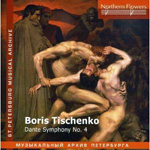 Intrigued
by several Musicweb International reviews of the music of this
supposed heir to Shostakovich on the Northern Flowers label,
I decided to try a recording that we haven’t yet reviewed.
Like so many late 20th-century works, I think it will take some
time for me to come to terms with the music - not that it’s
particularly avant-garde, but this one-movement work
is reminiscent of the bleaker side of Shostakovich, though it
has its serene moments. I suppose that a mixture of the hellish
and the heavenly is about right for a symphony entitled Purgatory.
Though the work appears to be programmatic, I haven’t been
able to track down any notes to download; I assume that the
CD offers these.
Intrigued
by several Musicweb International reviews of the music of this
supposed heir to Shostakovich on the Northern Flowers label,
I decided to try a recording that we haven’t yet reviewed.
Like so many late 20th-century works, I think it will take some
time for me to come to terms with the music - not that it’s
particularly avant-garde, but this one-movement work
is reminiscent of the bleaker side of Shostakovich, though it
has its serene moments. I suppose that a mixture of the hellish
and the heavenly is about right for a symphony entitled Purgatory.
Though the work appears to be programmatic, I haven’t been
able to track down any notes to download; I assume that the
CD offers these.
The performance is presumably as good as we are likely to get
and the recording, though it requires some tolerance, is acceptable.
Well worth a try from the Naxos Music Library before you decide
whether to purchase the CD from Musicweb International or the
download from eclassical.com.
Bargain
of the Month
Latin Boss: The Centenary Edition
Edmundo Ros and his Orchestra
UNIVERSAL/SPECTRUM MUSIC SPECSIG2045 [5CDs] - from amazon.co.uk
(mp3)
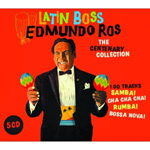 100
tracks of the music of Edmundo Ros, who died recently, aged
100, for just £5.49 - around half the price of the 5-CD
set, itself something of a bargain - has to be good value. In
his own way Ros was as consummate a conductor as Karajan - I
choose the comparison deliberately because neither left any
rough edges. He combined what he had learned about harmony,
composition and orchestration at the Royal Academy of Music
with a genuinely popular touch. Some of the pieces represent
his take on light classics. The recordings come from the Decca
stable and, though no dates are given, they are all good, and
all those that I have heard are in stereo. The only disconcerting
aspect of this release, apart from the hideous cover, is the
fact that each CD combines the fruits of several sessions, with
the piano appearing now on the left and then on the right.
100
tracks of the music of Edmundo Ros, who died recently, aged
100, for just £5.49 - around half the price of the 5-CD
set, itself something of a bargain - has to be good value. In
his own way Ros was as consummate a conductor as Karajan - I
choose the comparison deliberately because neither left any
rough edges. He combined what he had learned about harmony,
composition and orchestration at the Royal Academy of Music
with a genuinely popular touch. Some of the pieces represent
his take on light classics. The recordings come from the Decca
stable and, though no dates are given, they are all good, and
all those that I have heard are in stereo. The only disconcerting
aspect of this release, apart from the hideous cover, is the
fact that each CD combines the fruits of several sessions, with
the piano appearing now on the left and then on the right.
Freebies
of the Month
Havergal BRIAN (1876-1972)
Symphony No. 8 (1949) [22:44]
BBC Symphony Orchestra/Rudolf Schwarz - broadcast 20 December
1958. ADD/mono
Symphony No. 12 (1957) [12:50]
London Symphony Orchestra/Harry Newstone - broadcast 5 November
1959. ADD/mono
First Performance
[Both downloads available as single tracks in 192 kb/s mp3 from
Havergal
Brian Society.]
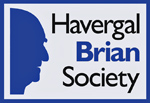 I’m
indebted to our Classical Editor, Rob Barnett, for pointing
me towards these two attractive downloads from the BBC Third
Programme - a useful reminder that Havergal Brian was not quite
as neglected as we may have come to believe, especially as Dutton
have released a CD of two other broadcasts from 1959, of the
Ninth and Eleventh Symphonies (CDBP9798).
I’m
indebted to our Classical Editor, Rob Barnett, for pointing
me towards these two attractive downloads from the BBC Third
Programme - a useful reminder that Havergal Brian was not quite
as neglected as we may have come to believe, especially as Dutton
have released a CD of two other broadcasts from 1959, of the
Ninth and Eleventh Symphonies (CDBP9798).
The performances sound a little tentative in places but are
generally very sympathetic. It’s just a shame that Sir
Adrian Boult’s broadcast/premiere of No.8 in 1954 is not
extant. The recordings require some tolerance but are certainly
acceptable. Well worth having despite the availability of the
Naxos (ex-Marco Polo) recording of No.12 (with No.4 on 8.570308
- see review).
The Eighth was included in a two CD set from EMI (see review).
Readers from countries where the copyright laws are more stringent
than the UK - shortly to be extended from fifty years here and
throughout the EU - will have to wrestle with their consciences
if they wish to click the disclaimer which allows the downloads.
Erkki-Sven TÜÜR (b.1959)
Fireflower [4:06]
Cincinnati Symphony Orchestra/Paavo Järvi - rec. May 2011.
DDD.
Download from cincinnatisymphony.org
(mp3)
No wrestling with consciences over copyright with my second
set of free downloads. The Cincinnati Symphony Orchestra are
offering free recordings of five specially commissioned Fanfares
to celebrate the 50th anniversary of their first broadcast concert
in 1960. I’ve highlighted Fireflower but all five are
well worth hearing in performances that cannot be other than
definitive.
***
Jacobus CLEMENS (c.1510-c.1556)
Motet: Inclita stirps Jesse [5:17]
Philippe ROGIER (c.1561-1596)
Missa Inclita stirps Jesse (1591 or earlier) [32:29]
Antonio de CABEZÓN (1510-1566)
Cancion francesca glosada (Organ solo) [2:12]
Philippe ROGIER
Missa Philippus Secundus Rex Hispaniæ (1598): Kyrie
eleison [3:30] Gloria in excelsis [5:44]
Da pacem, Domine a6 (Instrumental) [1:59]
Missa Philippus Secundus Rex Hispaniæ: Credo in unum
Deum [9:11]
Antonio de CABEZÓN
Ave maris stella (Organ solo) [3:58]
Philippe ROGIER
Missa Philippus Secundus Rex Hispaniæ: Sanctus &
Benedictus [6:27]; Agnus Dei [3:42]
His Majesty’s Sagbutts and Cornetts; Magnificat (Julie
Cooper, Alex Kidgell (soprano); Sally Dunkley, Caroline Trevor
(mean); Jeremy Budd, Matthew Long (tenor); Ben Davis, Eamonn
Dougan (baritone); Christopher Adams, Rob Macdonald (bass))/Philip
Cave - rec. February 2011. DDD/DSD.
Booklet with texts and translations included.
LINN CKD387 [74:39] - from linnrecords.com
(mp3, 16- and 24-bit lossless)
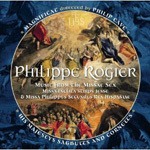 Thanks
primarily to Linn and Magnificat, with able assistance from
Hyperion, we now have a substantial recorded collection of the
music of the hitherto neglected renaissance composer Philippe
Rogier:
Thanks
primarily to Linn and Magnificat, with able assistance from
Hyperion, we now have a substantial recorded collection of the
music of the hitherto neglected renaissance composer Philippe
Rogier:
* Missa Ego sum qui sum and Motets (Linn CKD109
- see January 2009 Roundup)
* Polychoral Music including: Missa Domine Dominus noster
and Domine in virtute tua (Linn CKD348
- see March 2011/1 Roundup)
* Missa Ego sum qui sum and Motets (Hyperion CDA67807
- see May 2010 Roundup)
The new recording, like CKD348, features the use of instrumental
accompaniment from His Majesty’s Sagbutts and Cornetts
in the Missa Philippus Secundus; even those who dislike
such accompaniment will find its use here pretty unobtrusive.
In all other respects it’s hard to imagine there being
any objection to the new recording except from those temperamentally
unsuited to renaissance music - and I can’t imagine any
of them bothering to read this review. That the Missa Incilita
stirps is preceded by the Clemens motet which provides its
cantus firmus and that the vocal items are interspersed
with instrumental pieces by Cabezón and Rogier himself
are plus points in my book.
There are two advantages to downloading here: availability two
weeks in advance of the CD release date of November 14th and
the provision of a variety of formats, staring with mp3 at £8
and including, for audiophiles, better-than-CD 24/96 and 24/192
Studio Master (£18). I settled for CD-quality 16/44.1
wma (£10) and found the results superb. The excellence
of the performances and recording is matched by the booklet
of notes, texts and translations. I’ve recently criticised
Linn for not always providing these with downloads but they
have done us proud this time with a booklet rivalling the kind
which Hyperion produces.
Michael PRÆTORIUS (1571-1621)
Nun komm, der Heiden Heiland [6:32]
Pueri nostri concinite (Singet und klinget) [3:45]
Dances from Terpsichore [7:03]
Puer natus in Bethlehem (Ein Kind geborn) [6:23]
Quem pastores laudavere [6:22]
Vom Himmel hoch [3:27]
Es ist ein Ros’ entsprungen [1:24]
Dances from Terpsichore [7:46]
Wie schön leuchtet der Morgenstern [2:36]
Nun helft mir Gottes Güte schon preisen [3:06]
The Choir of Westminster Cathedral; The Parley of Instruments/David
Hill - rec.1986. DDD.
HYPERION HELIOS CDH55446 [49:13] - from hyperion-records.co.uk
(mp3 and lossless)
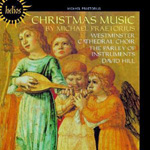 Only
the rather short playing time detracts from the appeal of this
reissue of music for Christmas interspersed with dances from
that wonderful collection Terpsichore. If the dances
are a little more restrained than at the hands of their re-discoverer,
David Munrow, who threw everything except the kitchen sink at
them, that’s in line with the thoughts of modern scholarship.
For once I even concur with David Hill’s making his choristers
employ the hard g in words like virgine: that’s
probably how it was pronounced in North Germany at the time
of Prætorius.
Only
the rather short playing time detracts from the appeal of this
reissue of music for Christmas interspersed with dances from
that wonderful collection Terpsichore. If the dances
are a little more restrained than at the hands of their re-discoverer,
David Munrow, who threw everything except the kitchen sink at
them, that’s in line with the thoughts of modern scholarship.
For once I even concur with David Hill’s making his choristers
employ the hard g in words like virgine: that’s
probably how it was pronounced in North Germany at the time
of Prætorius.
Dieterich BUXTEHUDE (c.1637-1707)
Complete Organ Works - Volume 4
Præambulum in a minor, BuxWV158 [4:35]
Ich Ruf zu Dir, Herr Jesu Christ, BuxWV196 [3:12]
Præludium in g minor, BuxWV148 [6:05]
Canzonetta in C, BuxWV167 [0:58]
Toccata in F, BuxWV156 [8:19]
Christ unser Herr zum Jordan kam, BuxWV180 [3:26]
Fuga in B flat, BuxWV176 [4:30]
Nun Lob, mein Seel, den Herren, BuxW214 [2:41]
Canzona in G minor, BuxWV173 [1:28]
Toccata in G, BuxWV164 [2:55]
Gott der Vater Wohn bei uns, BuxWV190 [3:09]
Canzonetta in a minor, BuxWV225 [2:05]
Passacaglia in d minor, BuxWV161 [5:17]
Wie schön leuchtet der Morgenstern, BuxWV223 [7:23]
Nun komm, der Heiden Heiland, BuxWV211 [1:59]
Der Tag, der ist so freudenreich, BuxWV182 [2:57]
In dulci iubilo, BuxWV197 [1:31]
Præludium in e minor, BuxWV142 [8:26]
Christopher Herrick (organ) - rec. Trinity College Chapel, Cambridge,
January 2011. DDD
HYPERION CDA67876 [71:06] - from hyperion-records.co.uk
(mp3 and lossless)
[‘Another memorable recording’ - see full review
by Byzantion]
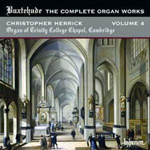 Some
time ago I complained that this series was progressing very
slowly but this follows hard on the heels of Volume 3.
Some
time ago I complained that this series was progressing very
slowly but this follows hard on the heels of Volume 3.
I see no reason to withhold from Volume 4 the warm welcome that
I’ve granted to earlier volumes in this series:
* Volume 2 (CDA67809) - January 2010 Roundup
* Volume 3 (CDA67855) - March 2011/2 Roundup
George Frideric HANDEL (1685-1759)
Concerto Grosso in G, Op.6/1 [11:46]
Antonio VIVALDI (1678-1741)
Concerto in B flat for two violins [10:58]
George Frideric HANDEL Concerto
Grosso in d minor, Op. 6/10 [13:56]
Antonio VIVALDI Concerto
in B flat for oboe and violin [9:23]
Johann Sebastian BACH (1685-1750)
Concerto in d minor for two violins [15:31]
Rachel Podger (violin)
Pavlo Beznosiuk (violin)
Frank de Bruine (oboe)
Academy of Ancient Music - rec.2005. DDD
Pdf booklet included
WIGMORE HALL LIVE WHLIVE0005 [61:36] - from classicsonline.com
(mp3)
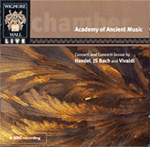 If
you followed my recommendation of Rachel Podger’s recordings
of Bach Violin Concertos on Channel Classics in the previous
Roundup, this is the ideal way to complete the set, with Podger
and Pavlo Beznosiuk together with the AAM in the Bach 2-violin
concerto. Live performance means that it comes complete with
warts and all but there are remarkably few of these and none
are really obtrusive. With good recording, and the booklet as
part of the deal, this is excellent value for £4.99.
If
you followed my recommendation of Rachel Podger’s recordings
of Bach Violin Concertos on Channel Classics in the previous
Roundup, this is the ideal way to complete the set, with Podger
and Pavlo Beznosiuk together with the AAM in the Bach 2-violin
concerto. Live performance means that it comes complete with
warts and all but there are remarkably few of these and none
are really obtrusive. With good recording, and the booklet as
part of the deal, this is excellent value for £4.99.
Johann Sebastian BACH (1685-1750)
Cantata No.110: Unser Mund sei voll Lachens (BWV 110)
[24:15]
Magnificat in D (BWV 243) [39:46]
with interpolations:
Dirck Janszoon SWEELINCK (1591-1652)
Hoe schoon lichtet de morghenster [1:48]
Jan Baptist VERRIJT (1600-1650)
Currite, pastores [4:16]
Johann Hermann SCHEIN (1586-1630)
O Jesulein, mein Jesulein [2:37]
Johann Michael BACH (1648-1694)
Ehre sei Gott in der Höhe [3:28]
Dorothee Mields (soprano 1)
Johannette Zomer (soprano 2) (Magnificat)
William Towers (alto)
Charles Daniels (tenor)
Stephan MacLeod (bass)
The Netherlands Bach Society/Jos van Veldhoven - rec. December
2009. DDD/DSD
Booklet with texts and translations included.
CHANNEL CLASSICS CCSSA32010 [64:29] - from channelclassics.com
(mp3, 24/44.1, 24/96 and 24/192 versions)
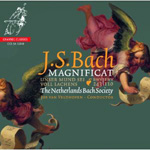 Two
festive works for Christmas Day, the cantata for performance
at the Hauptgottesdienst or chief morning service (Matins
+ lengthy sermon + Cantata + Eucharist) and the Magnificat
for Vespers, sung, as usual on high days, in Latin. Bach’s
original setting of the Magnificat contained several
Christmas interpolations and, although the Netherlands Bach
Society here performs the work in its later version in D, a
different set of interpolations has been included, from two
of Bach’s better-known and two of his lesser-known predecessors.
Inauthentic as the practice may be, it makes an interesting
and most enjoyable change from the usual choice.
Two
festive works for Christmas Day, the cantata for performance
at the Hauptgottesdienst or chief morning service (Matins
+ lengthy sermon + Cantata + Eucharist) and the Magnificat
for Vespers, sung, as usual on high days, in Latin. Bach’s
original setting of the Magnificat contained several
Christmas interpolations and, although the Netherlands Bach
Society here performs the work in its later version in D, a
different set of interpolations has been included, from two
of Bach’s better-known and two of his lesser-known predecessors.
Inauthentic as the practice may be, it makes an interesting
and most enjoyable change from the usual choice.
In other respects, too, this is a version which strongly challenges
existing recommendations, maintaining as it does the balance
between the sheer beauty and dramatic power of the sections
of the text: listen to deposuit potentes and the following
esurientes implevit (tracks 18-19).
In words such as magna (Quia fecit mihi magna)
the singers employ an interesting compromise between the hard
g which would probably have been employed in Germany in Bach’s
time and the softer Italian pronunciation, in this case the
ñ sound.
If you are looking for a version of the Magnificat without
the interpolations, Bach’s or anyone else’s, classicsonline.com
offer Andrew Parrot, the Taverner Consort and Players with a
fine team of soloists on a super-budget 2-CD Virgin recording,
coupled with Cantata No.4 and the Easter and Ascension Oratorios
(0724356164758 - here
- for just £6.99, albeit in mp3 only). Alternatively and
bizarrely, they offer Sigiswald Kuijken’s Magnificat
with Cantata No.21 - here
- in three download versions - two at £5.99 and the third
at £7.99.
You’ll almost certainly wonder where you’ve heard
the Christmas Cantata, No.110, before - in one of his self-borrowings,
Bach took much of the music from Orchestral Suite No.4, but
it’s no worse for that. It’s just about the only Bach
cantata for the Christmas season that I haven’t recommended
in one anthology or another, so its presence here in a lively
performance is an added incentive to go for this recording in
one format or another.
The Channel Classics recording is excellent - I chose the 24/96
version but audiophiles will prefer the 24/192, while most listeners
will be happy with the better-than-CD 24/44.1. The booklet is
of the high standard that I usually associate with Hyperion
and Gimell.
Johannette Zomer also features on a collection of 17th-century
English music, With Endless Teares (CCSSA26609) which
I recommended in SACD form - here
- and which comes in mp3 and Channel’s usual range of 24-bit
formats.
I reviewed her recording Love and Lament (CCSSA17002)
in an acceptable but not ideal mp3 download from emusic.com
in the August 2010 Roundup
- currently available from Channel only in SACD format.
Joseph HAYDN (1732-1809)
String Quartet in B flat, Op 71/1 [20:09]
String Quartet in D, Op 71/2 [17:00]
String Quartet in E flat, Op 71/3 [21:17]
Takács Quartet (Edward Dusinberre, Károly Schranz
(violins); Geraldine Walther (viola); András Fejér
(cello) - rec. November 2010. DDD
Pdf booklet included
HYPERION CDA67793 [58:28] - from hyperion-records.co.uk
(mp3 and lossless)
String Quartet in C, Op 74/1 [22:28]
String Quartet in F, Op 74/2 [20:53]
String Quartet in g minor ‘Rider’ Op 74/3 [20:20]
Takács Quartet (Edward Dusinberre, Károly Schranz
(violins); Geraldine Walther (viola); András Fejér
(cello)) - rec. November 2010. DDD
Pdf booklet included
HYPERION CDA67781 [63:43] - from hyperion-records.co.uk
(mp3 and lossless)
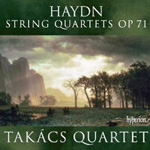
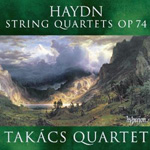 So
far the Takács Quartet have performed for Hyperion the
works of composers later than Haydn, composers for whom the
romantic landscapes on the covers have been thoroughly appropriate.
Seeing the wild romantic theme continued here - Op.71 sporting
a storm scene in the Yosemite (1865) and Op.74 an 1864 Storm
in the Rockies, both by Albert Bierstadt - I wondered if
the performances would represent a view of Haydn as precursor
in 1793 of the music of more than half a century later. Or would
they, perhaps, hint at his Sturm und Drang style continuing
longer than we normally think?
So
far the Takács Quartet have performed for Hyperion the
works of composers later than Haydn, composers for whom the
romantic landscapes on the covers have been thoroughly appropriate.
Seeing the wild romantic theme continued here - Op.71 sporting
a storm scene in the Yosemite (1865) and Op.74 an 1864 Storm
in the Rockies, both by Albert Bierstadt - I wondered if
the performances would represent a view of Haydn as precursor
in 1793 of the music of more than half a century later. Or would
they, perhaps, hint at his Sturm und Drang style continuing
longer than we normally think?
Actually, neither of these expectations was fulfilled; what
we have is a set of thoroughly conventional performances, as
recommendable in their own modern-instrument way as Hyperion’s
release of the Op.20 quartets from the period-instrument London
Haydn Quartet (CDA67877, 2-for-1: see September 2011/2
Roundup).
I see that some other reviewers liked the Op.20 set as well
as I did, though others thought it suited only to a limited
audience. There need be no such reservations this time.
If anything, I thought the Takács slightly too refined
or restrained in Haydn, as if they thought that they had to
hold back in a way that they don’t for Beethoven, Schubert,
Brahms and Schumann. Even so, the Takács at less than
their very best are by no means to be dismissed; though you
may prefer the budget-price versions from the Kodaly Quartet
on Naxos, these are not currently available to download in (good)
lossless sound, as the Hyperion recordings are, with flac and
alac at the same price as the mp3. The Op.71 set is even something
of a bargain, with the slightly under-strength playing time
taken into account in setting the price at £6.99 instead
of the usual £7.99. The recording, made at Wyastone, is
very good.
Ludwig van BEETHOVEN (1770-1827)
Complete Works for Piano and Orchestra
CD1 [80:41]
Piano Concerto No.1, Op.15 [36:50]
Piano Concerto No.4, Op.58 [33:07]
Rondo, WoO 6 [10:14]
CD2 [79:19]
Piano Concerto No.2, Op.19 [28:44]
Piano Concerto No.5, Op.73 ‘Emperor’ [37:30]
Beethoven and Mozart: An Obsession? A talk by Howard Shelley
[12:40]
CD3 [78:28]
Piano Concerto No.3, Op.37 [34:50]
Piano Concerto, Op.61, arr. from Violin Concerto [43:19]
CD4 [77:59]
Fantasia, Op. 80* [18:31]
Piano Concerto, WoO4, orch. Howard Shelley; premiere recording
[24:59]
Triple Concerto, Op.56† [33:51]
Tasmin Little (violin)† Tim Hugh (cello)†
Chorus of Opera North*
Orchestra of Opera North/Howard Shelley (piano and conductor)
Pdf booklet included
CHANDOS CHAN10695(4) [4 CDs, times as above] - from theclassicalshop.net
(mp3 and 16- and 24-bit lossless)
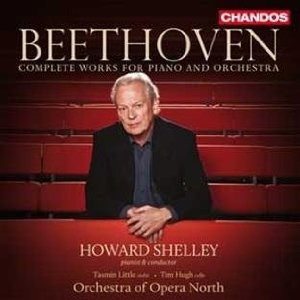 To
try to recommend one recording of the Beethoven Piano Concertos
en bloc would be a fool’s errand which I don’t
intend to undertake. In any case, no other complete set exactly
replicates what we have on offer here from Chandos - others
may contain the Choral Fantasia, the piano revision of
the Violin Concerto or the Triple Concerto, sometimes all three,
but Howard Shelley offers a unique extra in the form of his
own orchestration of the Concerto WoO4, the work of Beethoven
aged 12 or 13. To quote Barry Cooper’s excellent notes:
To
try to recommend one recording of the Beethoven Piano Concertos
en bloc would be a fool’s errand which I don’t
intend to undertake. In any case, no other complete set exactly
replicates what we have on offer here from Chandos - others
may contain the Choral Fantasia, the piano revision of
the Violin Concerto or the Triple Concerto, sometimes all three,
but Howard Shelley offers a unique extra in the form of his
own orchestration of the Concerto WoO4, the work of Beethoven
aged 12 or 13. To quote Barry Cooper’s excellent notes:
The main interest … lies in the piano part, which impresses
particularly through its tremendous energy. Its technical demands
indicate that, even at such an early age, Beethoven possessed
a formidable keyboard technique, especially in the right hand,
which predominates almost throughout.
To be offered recordings by two of the finest pianists around
in one month - see Stephen Hough’s Liszt and Grieg below
- is a treat indeed. If I say that Shelley and his team offer
very good performances, with nothing that made me want to scratch
away like Beckmesser at my critical slate, but that they didn’t
bring any revelations in the ‘regular’ concertos,
I don’t mean that as a criticism, rather as a statement
of the extent to which all concerned seem to be at one with
a composer who is often harder to gel with than we like to think.
In fact, there were several passages where I noticed some aspects
of the solo or orchestral writing that I hadn’t noticed
before, even in Concerto No.1.
For most listeners, Shelley’s Beethoven-as-is approach,
with clarity the hallmark, will be a positive virtue, though
that doesn’t mean that there’s any lack of power,
particularly in the Emperor. No one set can ever be definitive,
especially with the likes of Schoonderwoerd’s revelatory
chamber-size recordings on Alpha (see below) to supplement the
more conventional.
I’ve already mentioned the high quality of the booklet.
The recording is as much at one with the music as the performances
- I listened in the CD-quality 16-bit lossless: it also comes
in decent mp3 and audiophile 24/96 form. If you like to burn
your downloads to CD, the first disc will be something of a
problem; it’s over 80 minutes so you won’t be able
to squeeze the Rondo onto that or either of the other
discs unless you drop the talk.
About that fool’s errand … I can only mention a few
of the recordings that I consider my benchmarks for judging
this new set:
* Stephen Kovacevich and Colin Davis (Philips 475 6319 -
from passionato.com),
* Christian Zacharias with Hans Vonk and Kurt Masur on an inexpensive
EMI Triple, Nos.1-5 and Triple Concerto - see my review
of the CD set: download from classicsonline.com
for just £6.99. Don’t even dream of paying £8.99
for just Concertos 4 and 5, which as a budget-price release
cost less than that when it was available on CD. Amazon.co.uk
have the 3-CD download in several formats, one of which costs
a ridiculous £24.42; they also charge an even more ridiculous
£9.49 for Nos. 4 and 5 when at the time of writing they
have the CD for £0.74 - all download sites have their
quirks regarding prices. Caveat emptor.
* Arthur Schoonderwoerd/Christofori Ensemble (Alpha: 1 and 2
ALPHA155 - see July 2010 Roundup;
3 and ‘6’ ALPHA122; 4 and 5 ALPHA079
- see December 2010 Roundup)
- for a fine demonstration of what period performances can achieve
* Julius Katchen/Pierino Gamba (Nos.1-5, Triple Concerto, Decca
475 8449, download from passionato.com
- see November 2010 Roundup
* Wilhelm Kempff/Ferdinand Leitner (1-5: DGG 427 2372
- from passionato.com)
Ludwig van BEETHOVEN (1770-1827)
Complete Piano Sonatas
Bernard Roberts (piano)
Booklet includes track listings and brief notes.
NIMBUS NI1774 [11 CDs: 10 hours: 45 minutes]
Also available separately:
Ludwig van BEETHOVEN (1770-1827)
Piano Sonata No.8, Op.13 in c minor (‘Pathétique’)
[18:36]
Piano Sonata No.14, Op.27/2 in c-sharp minor (‘Moonlight’)
[16:45]
Piano Sonata No.21, Op.53 in C (‘Waldstein’) [26:05]
Piano Sonata No. 26 in E-flat, Op. 81a ‘Les Adieux’
[17:51]
NIMBUS NI7707 [79:17] - from classicsonline.com
(mp3)
Ludwig van BEETHOVEN (1770-1827)
The Last Three Sonatas
Piano Sonata No. 30 in E, Op.109 [19:40]
Piano Sonata No. 31 in A-flat, Op.110 [19:48]
Piano Sonata No. 32 in c minor, Op.111 [26:33]
NIMBUS NI7710 [66:07] - from classicsonline.com
(mp3)
Ludwig van BEETHOVEN (1770-1827)
Piano Sonata No. 21, Op. 53, in C (‘Waldstein’) [25:19]
Piano Sonata No. 17, Op. 31/2, in d minor (‘Tempest’)
[26:17]
Piano Sonata No. 31, Op. 110 in A-flat [20:09]
David Wilde (piano)
rec. September and November 2009, and March 2010, Reid Concert
Hall, University of Edinburgh, Scotland. DDD.
Booklet of notes included.
DELPHIAN DCD34090 [71:45] - CD or download from classicsonline.com
(mp3) or stream from Naxos Music Library
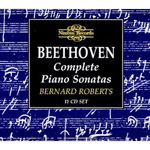
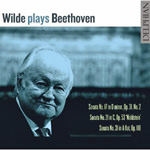 With
two highly recommendable Beethoven recordings on offer this
month, you may also be thinking about an integral set of his
Piano Sonatas. The virtues of complete sets by the likes of
Alfred Brendel are well enough known but, for some reason, we
seem never to have got round to reviewing the Nimbus set with
Bernard Roberts.
With
two highly recommendable Beethoven recordings on offer this
month, you may also be thinking about an integral set of his
Piano Sonatas. The virtues of complete sets by the likes of
Alfred Brendel are well enough known but, for some reason, we
seem never to have got round to reviewing the Nimbus set with
Bernard Roberts.
You’ll see that I’ve given download details for the
Wilde recording and the separate Roberts releases but not for
the Roberts set - at £87.89 from classicsonline.com, you’ll
find that better value on CD from Musicweb International: £28
post free at the time of writing - here.
With some ingenious organisation, too, the CD set is far less
bulky than you might imagine.
I actually started to write a review of the complete Nimbus
set for the main pages of Musicweb International some months
ago and lost what I’d written, apart from some notes and
jottings, when my computer crashed. Suffice it to say that I
dipped into sonatas from every period of Beethoven’s working
life, comparing what I heard with other versions that I knew,
and found that Roberts stood up well to the competition in every
respect - not always top dog in a particular sonata, but always
close.
Fortunately, when I lost what I’d written, my friend Geoffrey
Molyneux, who knows a great deal more about pianism than I ever
did and has owned the Nimbus set for some time, came to the
rescue. I hope to patch my notes back together to finish that
review for the main pages of MWI; meanwhile, though I’m
a little more sold on Roberts’ approach than GM and a little
less worried by the recording quality, I can’t do better
than quote his detailed comments:
I purchased this set of Beethoven piano sonatas about 10 years
ago when Nimbus were selling the collection, and also the complete
string quartets at rock-bottom prices. There was nothing to
lose financially, so they seemed very good value. However I
was not always happy with the recording quality, so I am pleased
to have the opportunity to reassess these discs.
The three sonatas of Opus 2, written in 1795, are in the traditional
four movements of the classical sonata. In the first movement
of Sonata No.1 in F minor, Bernard Roberts sets a perfect tempo
for the opening Allegro, not too fast, thereby allowing
for real clarity in the little triplet semiquaver figure at
the phrase end. In the second movement, marked Adagio
his playing is full of telling rubato whereby he never loses
the sense of pulse. Jenö Jandó on Naxos [download
individual CDs from this budget-price source from classicsonline.com
- BW] gives an excellent, but rather dry and matter-of-fact
performance here. In the ensuing Menuetto, Jandó
adopts a steadier tempo than Roberts, but in the Trio section
in F major Jando speeds forward, which is the opposite of normal
practice in such movements. But both pianists are very effective
here. Roberts well portrays the drama of the prestissimo
Finale, music which seems, partly because of the F minor key,
to anticipate the ‘Appassionata’ sonata of 1804/5.
The second sonata of Opus 2 is in the bright key of A major,
and Roberts copes superbly with the technical demands of the
triplet semiquavers with great clarity and energy. I like the
way he subtly slows into the second subject in a minor key and
in more dramatic mood. But brightness and cheerfulness are never
far away in this sunny movement. In the ensuing Largo there
is much passionate playing as requested by Beethoven with real
drama at the moment when the main D major theme returns fortissimo
in D minor. The scherzo is a delightful movement played here
with delicacy or drama as required, contrasted with a sad Minore
Trio section. The Rondo Finale however seems a little ponderous
at times, with the same rubato each time the main theme returns.
Sonata No.7 Opus 10 No.3 in D major is the biggest of the three
Opus 10 sonatas. Bernard Roberts gives a very fast and lively
performance with great impetus. However, I don’t like the
little ‘slowing downs’ at the ends of some phrases,
such as the opening scale motif in bar 4. This could become
irritating on repeated hearings. The texture also sounds a bit
muddy in the second subject and also later in the development
section, where individual strands of melody are not always as
clear as they could be. Sometimes the balance is too bass heavy,
for example in the concluding bars. Barenboim is superior in
all these respects.
In the second movement, Largo e mesto, Roberts gives
a strong and solid performance of great power. Although at times
the playing seems a little laboured compared with Jenö
Jandó, Roberts’ sense of phrasing is more telling.
The third movement Menuetto allegro is in a major key,
offering us much needed relief after the tragic intensity of
the second movement. Maybe a slightly quicker tempo, as in the
Jandó performance, would help the contrast. Roberts captures
well the humorous mood of the short, exuberant finale.
The first movement of Sonata No. 24 in c-sharp minor ‘Moonlight’
Opus 27 No.2 can be played successfully at a wide variety of
tempi. Herein lies the danger, because if it is played too slowly
tedium sets in. I never allow my students to play this movement
in competitions because I know the adjudicator will be thinking
‘Oh no, not that again’ Sure enough, you can tell
during the first bar whether you are in for a treat or for 5:00
or 6:00 of boredom. Roberts sets a slow speed here, nearly 7:00
for this movement, but it is so beautifully played with lovely
cantabile melodic lines that the performance holds the
attention from beginning to end. Nelson Freire takes only 5:30,
and his performance has much more flexibility of tempo than
Roberts. I think he is too quick, because there must be a real
contrast between this Adagio sostenuto and the second
movement which is marked allegretto. Roberts is very
successful in this respect, but maybe his Finale is a little
tame in comparison with Freire, who is considerably quicker.
Even more exciting in this movement is Rudolf Serkin who gives
a thrilling performance. Wilhelm Kempff adopts similar tempi
to Roberts in this last movement, but I have a preference for
Roberts in this work with his greater subtlety of phrasing and
expression.
The two works which form the climax of Beethoven’s so-called
middle period are the ‘Waldstein’ and the ‘Appassionata’,
the former a bright major key work, the latter tragic and in
the minor key to the bitter end. These works were longer than
his previous sonatas, continuing further along the new and revolutionary
paths hewn out of the rocks by the recently composed ‘Eroica’
symphony with its large subject groups, extensive developments
and expansive codas. Also, these two sonatas benefited from
Beethoven’s acquisition in 1803 of an Erard grand piano
with its extended treble.
Bernard Roberts gives a magnificent performance of the ‘Appassionata’
with real drama in the first movement, nobility, an elegiac
mood in the second, and a fast, furious and, fiery tempo in
the third. He gives full vent to the explosive dynamics that
Beethoven calls for, greater climaxes than in any previously-written
sonata. The only downside for me is a certain lack of mystery,
for example when the opening four bar melody is repeated a semitone
higher in the major key. Surely a contrast of mood is needed
in this unexpected moment so early in the sonata, an important
harmonic relationship we hear developed later in the work. Similarly,
why does the beautiful second subject in the relative major
begin so loudly? The crescendo doesn’t come until
the theme’s repeat an octave higher! Expressive opportunities
missed here, I feel. Listen to Barenboim and you will hear the
difference. Perhaps Barenboim is too romantic for some with
his greater use of pedal, which he adopts even in the ensuing
chromatic scale passage creating a hazy effect. But I find this
totally in keeping with Barenboim’s interpretation of the
work. Nevertheless, Roberts’ performance is first-rate
and very recommendable. Emil Gilels gives a massive and hugely
powerful performance of the first movement, but a tad slow for
an Allegro assai. Wilhelm Kempff hits just the right
tempo here, nigh on perfect in this respect throughout. The
occasional wrong note here and there in the first movement doesn’t
seem to matter. Both Kempff and Gilels play the second movement
beautifully, but Gilels wins in the Finale which is terrifyingly
dramatic. The clarity of texture is amazing at this tempo, and
Gilels performance is nothing short of phenomenal in its intensity
and virtuosity. But Kempff’s performance is really insightful,
very convincing and so musical, but maybe his lighter touch
and general approach to Beethoven is less convincing here, especially
compared with Gilels.
Sonata No. 26 in E flat Opus 81a ‘Das Lebewohl’ (‘Les
Adieux’) is a three movement work begun in 1809 at the
time when Napoleon’s armies reached Austria. One consequence
of this was the departure from Vienna in May that year of Beethoven’s
friend and patron the Archduke Rudolf. The first movement begins
with an adagio 3-note motif which has the three syllables of
the word Lebewohl (farewell) inscribed above them, and
this motif is developed in the ensuing Allegro. This adagio
and the second movement, andante espressivo (absence)
are beautifully played by Bernard Roberts who conveys Beethoven’s
feelings of sadness at the course of events. He copes really
well with the final movement, (The return) marked vivacissimamente
meaning very brisk and lively. However, here and in the first
movement’s allegro, Roberts does seem a little stolid and
dull when compared with Alfredo Perl on Arte Nova Classics.
Perl’s passagework really sparkles and glitters in the
finale, and his performance portrays well Beethoven’s happiness
at the return of Rudolf to Vienna in January 1810.
Sonata No.30 in E major, Opus 109 is the first of Beethoven’s
final three sonatas. They are amongst the greatest music ever
written by the composer [or any composer - BW],
perhaps only eclipsed by the late string quartets in their invention
and with far reaching consequences for the evolution of sonata
form. The first movement has an extraordinarily innovative structure
with its first subject, lyrical and syncopated and only eight
bars in length, leading directly to the second subject, Adagio
espressivo. It seems that it takes Roberts quite a while
before he gets into his stride here. Everything is perfectly
in place as it is in the second movement, Prestissimo,
but is it not a little dull! Contrast Barenboim here. His performance
is just that touch more characterful, and Barenboim really lives
this music. We just need more contrast in dynamics from Roberts,
more flexibility in the variety of tempi in the first movement,
more spacious lyricism and drama, this latter especially in
the second movement. But the third movement is as great a performance
of this music as I have ever heard. It is a deeply moving account,
and even the less-than-perfect recording quality doesn’t
detract from the experience. In the first movement, the recording
is so cavernous and reverberant, especially in the higher registers,
and the second movement which is pretty fast sounds far too
resonant. The recording really has let Roberts down in some
of the recording sessions.
In Beethoven’s final Sonata No.32 in C minor, Opus 111,
Bernard Roberts sets out with a steady, measured tempo in the
highly dramatic opening with its almost violent, characteristic
diminished 7th motif. But somehow the performance sounds a little
tame, carefully calculated but lacking the fervour that more
spontaneity would give to the performance. Jenö Jandó
on Naxos is preferable here with a little more forward movement
in the opening maestoso. This makes all the difference
and Jandó’s ensuing allegro is really hair-raising
in its virtuosity, making Roberts seem comparatively dull and
wooden. Also, Jandó has the advantage of a much more
sympathetic recording. I vividly remember Rudolf Serkin almost
running on to the Royal Festival Hall platform to play this
work. He rushed to the piano stool and hurled himself into the
opening motif before he had barely sat down. Theatrical yes,
but this opening needs to give a sense of a great experience
about to unfold. The second movement is beautifully played by
Roberts. I particularly liked the second variation which had
real rhythmic verve and forward thrust, but also the concluding
variation with some lovely phrasing and sparkling double trills.
Although I like Jandó’s Arietta, the statement
of the variation theme does seem a little characterless, but
I like his choice of tempi. For example, he moves variation
1 forward a little. Overall the faster music is livelier in
Jandó’s than in Roberts’ performance, but Jandó
is able to move gracefully towards the serenity of the finale
variations. He uses a wide variety of touch and articulation
to give an outstanding account, though perhaps without the insights
of the greatest players. Also, unless it is my imagination,
I can occasionally hear Jandó humming as he plays, perhaps
a little irritating on repeated playings.
Overall it is difficult to recommend any one complete set of
these sonatas. There are so many excellent versions available
including many players I have not mentioned here. As in complete
opera performances, one would be lucky to find a version that
was truly satisfying all the time in every respect. If you are
happy with a rather more romantic interpretation than some players
give us, I would recommend Daniel Barenboim’s live performances
on EMI Classics (DVDs) from Berlin in 2006. I believe Barenboim
to be one of the greatest musicians of our age, and in recent
years his performances of the Beethoven sonatas have been unsurpassed
in the profound depths of their expression and the meaning with
which he imbues these works. I would supplement this with a
wide variety of individual CDs, by players such as Kempff, Brendel
and Paul Lewis. In the budget division, I would choose Alfredo
Perl. As for Bernard Roberts, I would say that he gives some
wonderful performances, but sometimes sounds rather uninspired
and some sonatas suffer from poor recording. Particularly good
recordings are the Opus 10 sonatas and the Appassionata,
but sometimes the recordings sound too close and booming and
I feel as though I am inside the piano! So Roberts is well worth
hearing, but he is not top of my list.
Geoffrey Molyneux
David Wilde offers the middle-period Waldstein Sonata,
No.21 on his new recording, one of the works available separately
from Nimbus. Nimbus track this as two movements, running the
Introduzione and Rondo together, Delphian as three.
Some recordings even divide the work into four tracks. Wilde,
who takes both sections very slightly faster than Roberts, is
closer to the general consensus than Roberts and on the whole
slightly preferable. Brian Reinhart made this Recording
of the Month on CD - here
- and I’m certainly not going to quarrel with that accolade
for the download, in good mp3 sound. Whatever the mature version
of a Wunderkind is (Wundergraukopf?) Wilde is
it - where has he been all this time?
One advantage of the Delphian recording concerns the inclusion
of Wilde’s own notes which are informative not only about
the music but also about some his decisions in performance.
Even at the extremely advantageous price, I could have wished
that Nimbus had also offered more detailed notes.
Franz BERWALD (1796-1868)
Symphony No. 1 in g minor (Sinfonie sérieuse)
(1842) [31:56]
Konzertstück for Bassoon and Orchestra (1827) [11:14]
Symphony No. 2 in D (Sinfonie capricieuse) (1842) [27:39]
Symphony No. 3 in C (Sinfonie singulière) (1845)
[29:06]
Symphony No. 4 in E flat (1845) [28:38]
Christian Davidsson (bassoon)
Malmö Symphony Orchestra/Sixten Ehrling
BIS-CD-795/96 [2 CDs: 128:33] - from eclassical.com
(mp3 and lossless) or stream from Naxos Classical Library
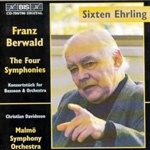 The
Swedish composer Franz Berwald was something of a polymath,
running a number of diverse business enterprises as well as
composing four of the most unusual symphonies ever written -
remarkable works which sound much more recent than their dates,
1842-45. Sixteen Ehrling recorded these symphonies in the 1960s
for Decca and those recordings are still available on the Bluebell
label - download from amazon.co.uk in mp3: here
and here,
or Nos. 3 and 4 from emusic.com: here.
Most will prefer his later BIS recordings with the Malmö
orchestra, available from eclassical.com; their price of $15.43,
in 16-bit lossless or mp3, compares very favourably with the
cost from other sites - classicsonline.com, for example, charge
£15.98 for mp3 only. Their download of the 2-CD EMI set
of the symphonies under Ulf Björlin is also uncompetitive
at £14.99 at the time of writing - when last available
on CD it cost about half that price.
The
Swedish composer Franz Berwald was something of a polymath,
running a number of diverse business enterprises as well as
composing four of the most unusual symphonies ever written -
remarkable works which sound much more recent than their dates,
1842-45. Sixteen Ehrling recorded these symphonies in the 1960s
for Decca and those recordings are still available on the Bluebell
label - download from amazon.co.uk in mp3: here
and here,
or Nos. 3 and 4 from emusic.com: here.
Most will prefer his later BIS recordings with the Malmö
orchestra, available from eclassical.com; their price of $15.43,
in 16-bit lossless or mp3, compares very favourably with the
cost from other sites - classicsonline.com, for example, charge
£15.98 for mp3 only. Their download of the 2-CD EMI set
of the symphonies under Ulf Björlin is also uncompetitive
at £14.99 at the time of writing - when last available
on CD it cost about half that price.
If you have yet to encounter Berwald’s music, be prepared
to be amazed. You won’t hear it better performed than here,
but if you are looking for just Nos. 3 and 4 and seeking a bargain,
classicsonline.com have the Musica Sveciæ recording (MSCD531
- here)
with Esa-Pekka Salonen for just £4.99.
Robert SCHUMANN (1810-1856): Three String Quartets,
Op.41
Quartet no.1 in a minor, Op.41/1 [24:29]
Quartet no.2 in F, Op.41/2 [20:56]
Quartet no. 3 in A, Op.41/3 [28:31]
Doric String Quartet (Alex Redington (violin); Jonathan Stone
(violin); John Myerscough (cello); Simon Tandree (viola)) -
rec. February 2011. DDD.
Pdf booklet available.
CHANDOS CHAN10692 [74:15] - from theclassicalshop.net
(mp3, 16- and 24-bit lossless)
[‘This is close to ideal Schumann interpretation’
- see review
by Gavin Dixon]
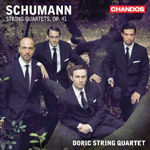 How
could I download such excellent performances that capture all
the nuances of Schumann’s highly original string quartets,
then forget about it for weeks? Part of the answer has to be
that I’m getting old and forgetful, but I’d also like
to think that it was because there are so many releases of fine
music in fine performances - and that at a time when the recorded
classical music industry is supposed to be dead - that they
just forced it out of my consciousness. After all, there were
three excellent releases of renaissance polyphony alone in my
previous roundup.
How
could I download such excellent performances that capture all
the nuances of Schumann’s highly original string quartets,
then forget about it for weeks? Part of the answer has to be
that I’m getting old and forgetful, but I’d also like
to think that it was because there are so many releases of fine
music in fine performances - and that at a time when the recorded
classical music industry is supposed to be dead - that they
just forced it out of my consciousness. After all, there were
three excellent releases of renaissance polyphony alone in my
previous roundup.
Schumann’s quartets are in many ways stronger meat than
even the late Beethoven quartets and there aren’t too many
rival versions in the catalogue, certainly not of all three.
Göran Forsling recommended the Fine Arts Quartet on Naxos
8.570151 as Bargain of the Month - see
review
- and Terry Barfoot recommended the Ysaÿe Quartet on Aeon
AECD0148 - see review.
I haven’t heard either but I very much doubt that they
could be preferable to the Doric performance and recording,
the latter heard in the CD-quality lossless version. A fine
successor in every respect to the Doric Quartet’s Walton
on CHAN10661 - see review.
Franz LISZT (1811-1886)
Piano Concerto No 1 in E flat, S124 [18:40]
Piano Concerto No 2 in A, S125 [20:34]
Edvard GRIEG (1843-1907)
Piano Concerto in a minor, Op.16 [29:46]
Stephen Hough (piano)
Bergen Philharmonic Orchestra/Andrew Litton
HYPERION CDA67284 [69:04] - from hyperion-records.co.uk
(mp3 and lossless)
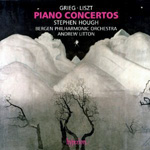 Unsurprisingly,
this recording made it into the Specialist Classical chart in
the very first week that it was released.
Unsurprisingly,
this recording made it into the Specialist Classical chart in
the very first week that it was released.
Alfred Brendel’s first (Vox) recordings of the two Liszt
Piano Concertos, reissued by Beulah Extra on 4BX165 and
5BX165 - see November 2011/1 Roundup
- provide object lessons in how to turn mere warhorses into
thoroughbreds and their reissue at a very reasonable price earned
a recommendation from me. At the end of that review I mentioned
that these new Hyperion recordings should be worth waiting for
and so it proves - if anything Stephen Hough makes all three
works here sound even more thoroughbred, achieving a lightness
of touch which nevertheless doesn’t preclude bravura.
Of course, you can’t have your cake and eat it; if you
want these works to sound real barn-stormers, you’ll need
to look elsewhere. For most of us, however, with a version of
the Grieg Piano Concerto to rival the classic Clifford Curzon
or either of Leif-Ove Andsnes’s versions, this sits at
or near the top of the tree.
See the October 2011/1 Roundup
for Curzon, download only on its own from Beulah Extra or with
Peer Gynt Suites on Decca from passionato.com, and my review
of the budget Virgin reissue of Andsnes’s first recording,
with shorter pieces and Liszt’s Piano Concerto No.2, 3913692.
If you don’t require both Liszt concertos, that Virgin
reissue at around £7 is well worth considering.
Johannes BRAHMS (1833-1897)
Ein deutsches Requiem nach Worten der heiligen Schrift,
Op.45 (A German Requiem)
Irmgard Seefried (soprano); George London (bass-baritone); The
Westminster Choir; New York Philharmonic Orchestra/Bruno Walter
- rec. 1954. ADD/mono
BEULAH EXTRA 4-10BX145 [62:58] - from eavb.co.uk
(for December 2011 release)
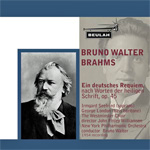 Though
slated for December 2011 release, this is already available,
so I decided to grapple with it. Of all the many Requiem
settings that I know and of all the works of Brahms, most of
which I love dearly, this is my bête-noire par excellence.
I just can’t like it however hard I try and however renowned
the performance, such as the Rattle (EMI) and Bernius (Carus)
recordings which I reviewed in the May 2009 Roundup.
For all that I wrote then, I don’t think that I’ve
returned to either version. The only recordings that I possess
were bought for the sake of the other choral works on the partner
disc (Sawallisch, Philips, no longer available) or came as part
of a 4-disc set which, again, I kept for the sake of the other
music (Ansermet, Decca Eloquence - see review).
Though
slated for December 2011 release, this is already available,
so I decided to grapple with it. Of all the many Requiem
settings that I know and of all the works of Brahms, most of
which I love dearly, this is my bête-noire par excellence.
I just can’t like it however hard I try and however renowned
the performance, such as the Rattle (EMI) and Bernius (Carus)
recordings which I reviewed in the May 2009 Roundup.
For all that I wrote then, I don’t think that I’ve
returned to either version. The only recordings that I possess
were bought for the sake of the other choral works on the partner
disc (Sawallisch, Philips, no longer available) or came as part
of a 4-disc set which, again, I kept for the sake of the other
music (Ansermet, Decca Eloquence - see review).
If, like me, you are looking for a recording to convince you,
there are many virtues on this classic Bruno Walter set, arising
not least from his refusal to let the music drag in the outer
sections, 1-2 and 6-7, in each of which Rattle, for example
is a good deal slower. In No.2, Denn alles Fleisch, Harry
Christophers and The Sixteen on Coro take 14:50 against Walter’s
13:08. With excellent solo and choral singing and very good
support from the NYPO, this may well do it for you.
The recording, despite Beulah’s treatment, sounds rather
drab, even for 1954, though it doesn’t distort, even at
climaxes. There’s a Sony Classical transfer, coupled with
the Alto Rhapsody - especially good value in the US at
$7.54 and with mp3 download, though at a more expensive $9.99
for some off reason. It’s rather less of a bargain from
amazon.co.uk at £10.52, with no equivalent download, so
I imagine that the many admirers of the work and of Walter’s
recording of it will wish to snap up Beulah’s less expensive
alternative, seven tracks for £0.75 or £1.00 ($1.20
or $1.61) each, depending on length. I’m just sorry that
I can’t be more enthusiastic about the music.
Johan Severin SVENDSEN (1840-1911)
Orchestral Works, Volume 1
Karneval i Paris (Carnival in Paris), Op.9 [12:01]
Romeo und Julia, Op.18 [10:01]
Fest-Polonaise, Op.12 [10:41]
Romanze, Op.26* [7:35]
Träume (Dreams) [3:44]
Zorahayda, Op.11 [11:31]
I Fjol gjætt’e Gjeitinn (last year I was herding
the mountain goats) [3:50]
Sæterjentens Søndag (Sunday on the Mountain
Pasture) [2:41]
Norwegian Rhapsody No.1, Op.17 [7:46]
Norwegian Rhapsody No.2, Op.19 [9:15]
Marianne Thorsen (violin)*
Bergen Philharmonic Orchestra/Neeme Järvi
CHANDOS CHAN10693 [80:00] - from theclassicalshop.net
(mp3 and 16- and 24-bit lossless)
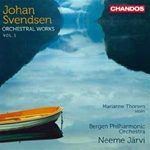 When
I reviewed the Beulah Extra reissue of Karneval i Paris
in the June 2011/1 Roundup,
I remember thinking that this was the kind of music that didn’t
get played and recorded as much as it deserved these days. For
those who share that thought, Järvi’s performance
here makes an idiomatic and entertaining modern replacement.
As the generously-timed programme progresses, however, entertaining
is about all that Svendsen’s music amounts to. Burn this
download to an mp3 CD-R for the car (it’s too long to burn
as a music CD-R) and you have music for an 80-minute journey
that won’t contribute to whatever blood-pressure-raising
incidents happen en route - in my case a 28-mile jam
on the M25. With good recording to add to its virtues, I’m
sorry to be rather lukewarm in my praise.
When
I reviewed the Beulah Extra reissue of Karneval i Paris
in the June 2011/1 Roundup,
I remember thinking that this was the kind of music that didn’t
get played and recorded as much as it deserved these days. For
those who share that thought, Järvi’s performance
here makes an idiomatic and entertaining modern replacement.
As the generously-timed programme progresses, however, entertaining
is about all that Svendsen’s music amounts to. Burn this
download to an mp3 CD-R for the car (it’s too long to burn
as a music CD-R) and you have music for an 80-minute journey
that won’t contribute to whatever blood-pressure-raising
incidents happen en route - in my case a 28-mile jam
on the M25. With good recording to add to its virtues, I’m
sorry to be rather lukewarm in my praise.
Antonín DVOŘÁK (1841-1904)
Slavonic Dance in C, Op. 46/1 [4:02]
Symphony No. 9 in e minor, Op. 95, B178, ‘From the New
World’ [42:16]
Czech Suite, Op. 39 [23:33]
Slavonic Dance in e minor, Op. 72/2 [5:50]
Bournemouth Symphony Orchestra/José Serebrier - rec.
June 2011. DDD
WARNER CLASSICS 2564666563 [75:21] - available in mp3
from amazon.co.uk
or hmvdigital.com
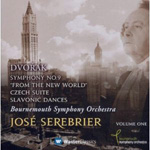 Though
Marin Alsop has recorded the New World Symphony, for
Naxos, it was not with the Bournemouth Orchestra of which she
was then chief conductor, so it’s fitting that José
Serebrier should do so. This is billed as the first of a series.
Let me say at once that, though I wouldn’t place Serebrier’s
New World in the very top flight, this first release
impressed me enough to make me look forward with interest to
the remaining albums. Those who like this symphony to dance
will almost certainly be more than happy - the placing of the
two Slavonic Dances fore and aft presages the performance of
the symphony - especially if their collection lacks a recording
of the beautiful Czech Suite.
Though
Marin Alsop has recorded the New World Symphony, for
Naxos, it was not with the Bournemouth Orchestra of which she
was then chief conductor, so it’s fitting that José
Serebrier should do so. This is billed as the first of a series.
Let me say at once that, though I wouldn’t place Serebrier’s
New World in the very top flight, this first release
impressed me enough to make me look forward with interest to
the remaining albums. Those who like this symphony to dance
will almost certainly be more than happy - the placing of the
two Slavonic Dances fore and aft presages the performance of
the symphony - especially if their collection lacks a recording
of the beautiful Czech Suite.
I’ve stressed the dancing quality of this New World,
but that doesn’t mean that it’s merely fast - just
the opposite in places - and there’s also plenty of drama
where required. It’s merely the strength of the opposition,
some of it at budget price, and an occasional tendency to make
the music sound episodic that prevents my placing it among the
select few at the top of the pile, which include:
* Symphonies 8 and 9: Budapest FO/Iván Fischer (Channel
Classics CCSSA90110 - download here
- see July 2010 Roundup)
* Symphonies 8 and 9: Rafael Kubelík (DGG Originals 447
4122 - mentioned in July 2010 Roundup)
* Symphony 9 (with SMETANA Vltava): Czech Philharmonic/Karel
Ančerl (Supraphon - mp3 from emusic.com - here)
OR (with In Nature’s Realm, Othello - here)
* Symphony 9 only: Philharmonia/Wolfgang Sawallisch (Beulah
1-4BX166 - see November 2011/1 Roundup)
I hope that future releases will include the other Slavonic
Dances, though I can’t imagine that anyone could improve
on the Channel Classics recording from Iván Fischer (CCSSA90210)
which I recommended in the November 2011/1 Roundup.
The recording is excellent, as obtained direct from Warners
in lossless wav format. Those who commented on the lack of bass
in the recent Chandos Delius Concertos recording - I wasn’t
among them, but I hear what they mean - will find plenty of
what they are looking for here.
If you already have a good version of the New World but
would like the Czech Suite, classicsonline.com have the
Virgin Classics 2-CD RLPO, CzechPO/Libor Pešek set of the
American and Czech Suites, with the Scherzo Capriccioso,
The Wild Dove and the Overtures for the attractive price of
£6.99 (0094635925050).
Emusic.com have Jakub Hrusa’s recording on Supraphon -
with the Waltzes and Polonaise, or you can download just the
five movements of the Suite for a reasonable £2.10).
Antonín DVOŘÁK
(1841-1904)
String Quartet No.13 in G, Op. 106, B192 [36:44]
String Quartet No.12 in F, Op. 96, ‘American’, B179
[26:24]
Pavel Haas Quartet - rec. Rudolfinum, Prague June 2010
SUPRAPHON SU4038-2 [63:08] - from emusic.com
(mp3)
[see review by Brian Reinhart: Recording of the Month
- here.]
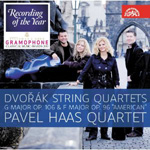 You
don’t have to be Czech to play Dvořák, but, unless you’re
Charles Mackerras, who was something of an adoptee anyway, it
helps. These performances are something special - not for nothing
did Brian Reinhart make it his Recording of the Month.
More recently, it’s even been voted a well-deserved Recording
of the Year. Even if, as is likely, you have another good
recording of the American Quartet, this is a mandatory
purchase, despite Jonathan Woolf’s slightly less enthusiastic
review* - here
- if only for the excellent performance of B192, which deserves
to be performed almost as much as its better-known partner.
You
don’t have to be Czech to play Dvořák, but, unless you’re
Charles Mackerras, who was something of an adoptee anyway, it
helps. These performances are something special - not for nothing
did Brian Reinhart make it his Recording of the Month.
More recently, it’s even been voted a well-deserved Recording
of the Year. Even if, as is likely, you have another good
recording of the American Quartet, this is a mandatory
purchase, despite Jonathan Woolf’s slightly less enthusiastic
review* - here
- if only for the excellent performance of B192, which deserves
to be performed almost as much as its better-known partner.
* perhaps caught on a bad day - he admits that he sounds more
critical than he feels.
The tracks come by no means at an ideal bit-rate but sound perfectly
acceptable; at around 225kb/s, they are at least better than
the minimum 192kb/s, not always a given with emusic.com. Their
price of £3.36 or less compares favourably with amazon.co.uk’s
asking price of £7.49, though that should be offered at
around 256kb/s.
Follow up with the Haas Quartet’s earlier Supraphon recording
of Prokofiev String Quartets 1 and 2 and the Sonata for two
violins - download from emusic.com - here
- see review.
Ralph VAUGHAN WILLIAMS (1872-1958)
Suite for viola and small orchestra [25:35]
Sir John McEWEN (1868-1948)
Viola Concerto [31:14]
Ralph VAUGHAN WILLIAMS Flos
Campi (Suite for viola, wordless chorus and orchestra) [19:46]
Lawrence Power (viola)
BBC National Orchestra and Chorus of Wales/Martyn Brabbins -
rec. January 2011. DDD
Pdf booklet included
HYPERION CDA67839 [76:37] - from hyperion-records.co.uk
(mp3 and lossless)
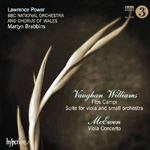 Another
feather in the cap of Lawrence Power, Hyperion and the various
orchestras and conductors with whom he and they have recorded
music by Rózsa, Serly and Bartók (CDA67687
- see review),
Bowen and Forsyth (CDA67546 - see review)
and Walton and Rubbra (CDA67587: Recording of the
Month - see review
and review).
Another
feather in the cap of Lawrence Power, Hyperion and the various
orchestras and conductors with whom he and they have recorded
music by Rózsa, Serly and Bartók (CDA67687
- see review),
Bowen and Forsyth (CDA67546 - see review)
and Walton and Rubbra (CDA67587: Recording of the
Month - see review
and review).
There are several good recordings of Flos Campi, one
of the most utterly beautiful pieces of music ever composed,
but the VW Suite is also welcome, as is the music by McEwen.
That all the music was composed for Lionel Tertis is the key,
but no apology need be made for offering them. Even if neither
of these fillers is in the same league as Flos, both
of them deserve hearings in such fine performances and recordings.
Ralph VAUGHAN WILLIAMS (1872-1958)
A London Symphony (1910 - revised version) [44:49]
William MATHIAS (1934-1992)
Celtic Dances (1972) [13:57]
National Youth Orchestra of Wales/Owain Arwel Hughes - rec.
August 2008. DDD.
DIVINE ART DIVERSIONS DDV24135 [58:47] - from theclassicalshop.net
(mp3 and lossless) or stream from Naxos Music Library.
[‘This is an admirable pairing and not just for the sound
rendition of the Vaughan Williams’ A London Symphony,
but also for the unusual and pleasing addition of Mathias’s
winsome Celtic Dances to conclude the disc.’ - see review
by Em Marshall]
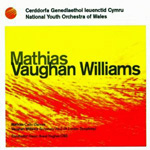 The
new Hallé recording of the London Symphony, which
earned the Recording of the Month accolade from
John Quinn (CDHLL7529 - see review)
had not yet made it onto the download list at the time of writing.
I hope to be able to review it in the near future; meanwhile
the Hickox recording of the original, longer version remains
unassailable (see link below to my review of the USB release
of all the VW symphonies which he recorded for Chandos), with
Barbirolli (remembered from the Pye Golden Guinea LP), Haitink
and Handley in the revised score.
The
new Hallé recording of the London Symphony, which
earned the Recording of the Month accolade from
John Quinn (CDHLL7529 - see review)
had not yet made it onto the download list at the time of writing.
I hope to be able to review it in the near future; meanwhile
the Hickox recording of the original, longer version remains
unassailable (see link below to my review of the USB release
of all the VW symphonies which he recorded for Chandos), with
Barbirolli (remembered from the Pye Golden Guinea LP), Haitink
and Handley in the revised score.
The Divine Art recording is by no means to be despised - it’s
just a little too business-like at too early a stage in the
first movement for my liking but the other movements go well
- and it comes with several advantages, not least the inclusion
of William Mathias’s attractive Celtic Dances. The download
from theclassicalshop.net is inexpensive, too - £4.99
for mp3 or £7.99 for lossless. Classicsonline.com also
offer it in mp3 for £4.99 and it’s available for
streaming from the Naxos Music Library.
For some inexplicable reason, the classicsonline.com download
of the Haitink - here
- costs £8.99 instead of the usual £7.99, but it’s
still just less expensive than the CD. They have the Handley
2-CD set of Nos. 2 and 6 for £5.99 - here
- but steer clear of the alternative Classics for Pleasure single-CD
coupling of 2 and 8, which costs £8.99, about 50% more
than the equivalent CD. Clearly, I was optimistic in thinking
that they had got all their prices for the EMI catalogue sorted
out - but amazon.co.uk take the biscuit with a price of £9.49
for the CfP download of 2 and 8, the same as for the (full price)
Haitink download.
I recommended the Beulah reissue of Sir Henry Wood’s recording
of the VW (34PD3) as a backup version for those with
a modern account in the February 2011 Roundup.
The mono Boult recordings, too, from the early 1950s, are well
worth considering - see November 2010 Roundup.
To the best of my knowledge, there is no alternative version
of the Mathias on CD or as a download except the Lyrita Welsh
dance anthology (SRCD.334 - see review).
Ralph VAUGHAN WILLIAMS (1872-1958)
Film Music Volumes 1-3
Volume 1
Scott of the Antarctic - suite (1948) [41:12]
Coastal Command - suite (1942) [23:43]
The People’s Land (1942) [13:17]
Merryn Gamba (soprano); Sheffield Philharmonic Chorus
BBC Philharmonic Orchestra/Rumon Gamba - rec. 2002. DDD
CHANDOS CHAN 10007 [78:30]
[Recording of the Month - see review
by Ian Lace]
[‘Immaculately prepared and executed’ - see review
by Rob Barnett]
Volume 2
49th Parallel (1940) [38:43]
The Dim Little Island (1949) [7:36]
The England of Elizabeth (1955) [24:22]
All edited or partially reconstructed by Stephen HOGGER
Emily Gray (soprano); Martin Hindmarsh (tenor); Chetham’s
Chamber Choir
BBC Philharmonic Orchestra/Rumon Gamba - rec. 2003. DDD
CHANDOS CHAN 10244 [70:47]
[‘It is to be hoped that this latest volume will not be
the last’ - see review
by Christopher Thomas]
Volume 3
The Story of a Flemish Farm (Suite from the film The
Flemish Farm) (1942) [25:08]
The Loves of Joanna Godden (1946)* [15:13]
Ralph VAUGHAN WILLIAMS and
Ernest IRVING (1878-1953)
Bitter Springs (1950) [25:57]
* (edited by Stephen HOGGER)
Ladies of Manchester Chamber Choir/Darius Battiwalla
BBC Philharmonic Orchesta/Rumon Gamba - rec. 2005. DDD
CHANDOS CHAN10368 [66:37]
[‘Once again [this] will be of considerable interest to
the VW enthusiast’ - see review
by Christopher Thomas]
Available separately in all formats; also available as a set
(3 for the price of 2) on CD (see review)
and in mp3 and lossless downloads as CHAN10529 with pdf
booklets included- from
theclassicalshop.net.
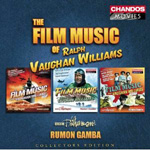 The
original reviews say in detail just about everything that I
could say about the high quality of the music, the performances
and the recordings. I’ve already had my say about Volume
1 - one of the Chandos recordings which I highlighted to celebrate
30 Years of Chandos in the June 2009 Download Roundup,
so I need only add that the lossless download is excellent and
that it’s well worth making the substantial saving by buying
the three albums in the one package - if you go for any one
singly, you’ll want the rest anyway. The booklet is (are)
actually the three separate booklets from the original releases.
Only Chandos’s incorrect claim ‘originally recorded
in 2008’ jars; the real dates are as above.
The
original reviews say in detail just about everything that I
could say about the high quality of the music, the performances
and the recordings. I’ve already had my say about Volume
1 - one of the Chandos recordings which I highlighted to celebrate
30 Years of Chandos in the June 2009 Download Roundup,
so I need only add that the lossless download is excellent and
that it’s well worth making the substantial saving by buying
the three albums in the one package - if you go for any one
singly, you’ll want the rest anyway. The booklet is (are)
actually the three separate booklets from the original releases.
Only Chandos’s incorrect claim ‘originally recorded
in 2008’ jars; the real dates are as above.
Without suggesting that Chandos have a monopoly on VW - Hyperion
have done well by him, too* - I’ve already recommended
the USB release of their Vaughan Williams symphonies recordings
under Richard Hickox (CHUSB0008 - here),
together with three from their earlier Bryden Thomson set to
cover the gaps which Hickox left.
* see, for example, their new recording of Flos Campi,
above.
Kurt SCHWERTSIK (b. 1935)
Nachtmusiken, Op.104 (2010)* [23:30]
Herr K entdeckt Amerika, Op.101 (2008)* [14:38]
Baumgesänge, Op.65 (1992) [21:26]
* premiere recording
BBC Philharmonic/HK Gruber - rec. August 2010. DDD.
Pdf booklet available.
CHANDOS CHAN10687 [59:52] - from theclassicalshop.net
(mp3 and 16- and 24-bit lossless)
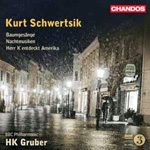 Are
you looking for approachable but not banal music from a contemporary
composer? Here it is: well performed and excellently recorded.
I hadn’t heard a note of this before but I thoroughly enjoyed
it all. You’ll find all that you need to know about it
in the review
by Nick Barnard.
Are
you looking for approachable but not banal music from a contemporary
composer? Here it is: well performed and excellently recorded.
I hadn’t heard a note of this before but I thoroughly enjoyed
it all. You’ll find all that you need to know about it
in the review
by Nick Barnard.
Andrzej PANUFNIK (1914-1991)
Cello Concerto (1991)
Mstislav Rostropovich (cello); London Symphony Orchestra/Hugh
Woolf
NMC SINGLE D0105 [19:02] - from emusic.com
(mp3)
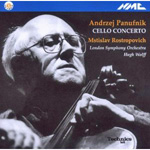 Attractive
music in two contrasted movements, completed only just before
the composer’s death, and dramatic yet approachable. One
could hardly find a better interpreter than Rostropovich, ably
assisted here. Although the transfer is at a woefully low 157kb/s,
the quality of the performance shines through in this emusic.com
version which, at £0.84 or less is something of a bargain.
It’s still good value in better-quality downloads at £3.99
or £4.99 (mp3 and lossless flac respectively) direct from
NMC - here
- but, unfortunately, I don’t have review access to their
own downloads.
Attractive
music in two contrasted movements, completed only just before
the composer’s death, and dramatic yet approachable. One
could hardly find a better interpreter than Rostropovich, ably
assisted here. Although the transfer is at a woefully low 157kb/s,
the quality of the performance shines through in this emusic.com
version which, at £0.84 or less is something of a bargain.
It’s still good value in better-quality downloads at £3.99
or £4.99 (mp3 and lossless flac respectively) direct from
NMC - here
- but, unfortunately, I don’t have review access to their
own downloads.
Howard SKEMPTON (b.1947)
Lento
BBC Symphony Orchestra/Mark Wigglesworth - rec.1991. DDD.
NMC SINGLE D0005 [12:57] - from theclassicalshop.net
(mp3 and lossless)
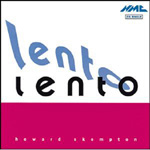 This
haunting work has, deservedly, become something of a cult piece
almost on the scale of the once ubiquitous ‘Albinoni’
Adagio or Allegri’s Miserere. At £2.10/£2.70
(mp3 and lossless respectively), the download from theclassicalshop.net
is particularly good value, too. If you like Arvo Pärt
or Peteris Vasks - the first time I heard it, I thought it was
by one of them - you’ll like this.
This
haunting work has, deservedly, become something of a cult piece
almost on the scale of the once ubiquitous ‘Albinoni’
Adagio or Allegri’s Miserere. At £2.10/£2.70
(mp3 and lossless respectively), the download from theclassicalshop.net
is particularly good value, too. If you like Arvo Pärt
or Peteris Vasks - the first time I heard it, I thought it was
by one of them - you’ll like this.
Epiphany at St Paul’s
Alwyn SURPLICE Hymn: Brightest
and best of the sons of the morning [3:14]
Felix MENDELSSOHN When Jesus
our Lord [6:53]
William BYRD Praise our
Lord, all ye Gentiles [3:12]
ANONYMOUS Coventry Carol
[2:43]
Jacob HANDL Omnes de
Saba venient [2:02]
Luca MARENZIO Tribus
miraculis [2:57]
Judith BINGHAM Epiphany
[4:15]
Peter CORNELIUS The Three
Kings (arr. Sir Ivor Algernon ATKINS) [2:41]
William CROTCH Lo! Star-led
chiefs [5:20]
Sir Frederick Arthur Gore OUSELEY
From the rising of the sun [2:34]
Samuel Sebastian WESLEY
Ascribe unto the Lord [14:54]
Herbert HOWELLS Here is
the little door [3:49]
Johannes ECCARD When to
the temple Mary went [3:37]
Christopher DEARNLEY Hymn:
The growing limbs of God the Son [3:14]
William BYRD Senex puerum
portabat [2:23]
Gustav HOLST Nunc dimittis
[3:36]
Hymn: Was lebet (O worship the Lord in the beauty of
holiness!) [3:09]
Huw Williams (organ)
The Choir of St Paul’s Cathedral/John Scott - rec.2001.
DDD
Pdf booklet included
HYPERION HELIOS CDH55443 [72:13] - from hyperion-records.co.uk
(mp3 and lossless)
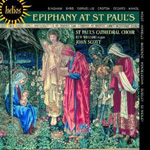 It’s
a little early to be thinking of Christmas, let alone Epiphany
(January 6th), but that won’t stop a flood of new seasonal
releases appearing - I see that the big guns of the pop and
middle-of-the-road world are already lining up Rihanna against
Susan Boyle and Justin Bieber. There’s nothing new in that
sense about this collection from St Paul’s, though some
of the music will be less familiar. These are first-class performances
of their kind, backed by good recording.
It’s
a little early to be thinking of Christmas, let alone Epiphany
(January 6th), but that won’t stop a flood of new seasonal
releases appearing - I see that the big guns of the pop and
middle-of-the-road world are already lining up Rihanna against
Susan Boyle and Justin Bieber. There’s nothing new in that
sense about this collection from St Paul’s, though some
of the music will be less familiar. These are first-class performances
of their kind, backed by good recording.
Don’t overlook the earlier but slightly more expensive
companion recording, Advent at St Paul’s, on Hyperion CDA66994.
In fact, if you are looking at liturgical relevance, with Advent
preceding and Epiphany following Christmas, that should be your
first port of call.

